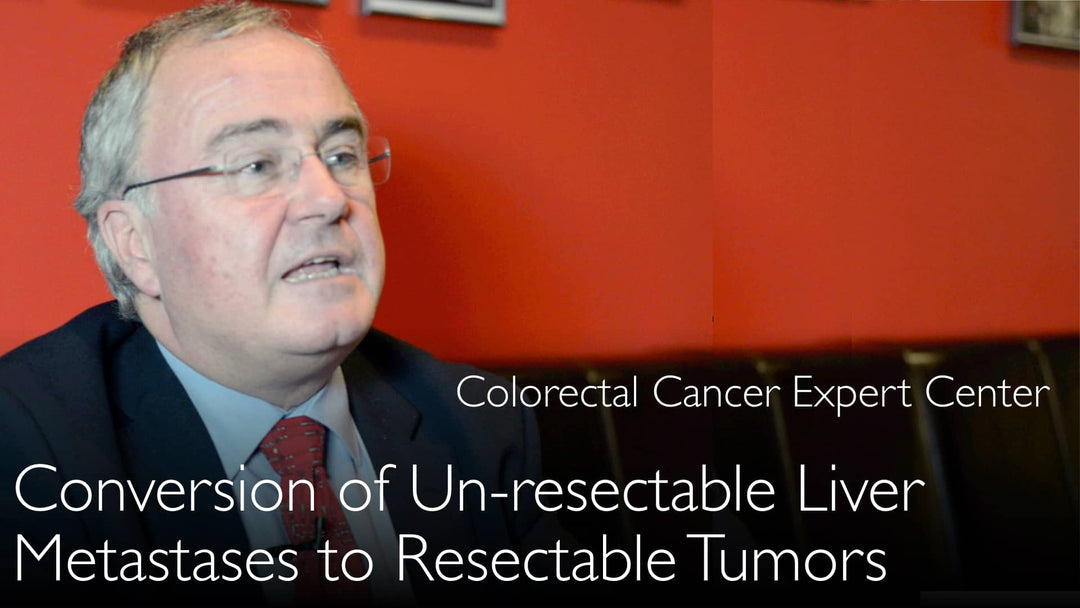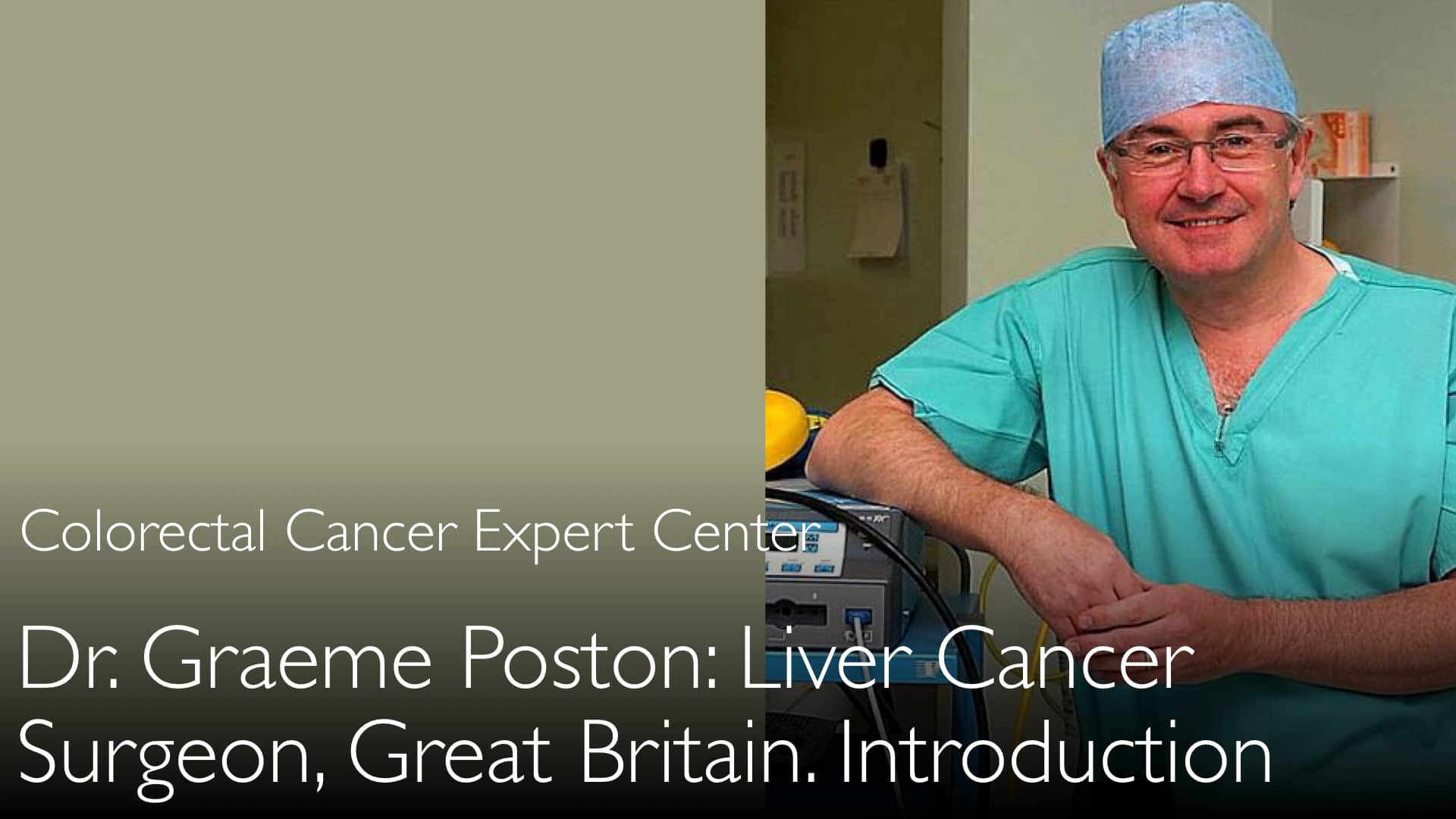Leading expert in colorectal cancer liver metastases, Dr. Graeme Poston, MD, explains how to convert inoperable liver tumors to operable ones. He details the best chemotherapy regimens for achieving high tumor response rates. Dr. Graeme Poston, MD, emphasizes the critical importance of first-line treatment selection. He strongly advocates for EGFR inhibitors in KRAS wild-type tumors. He also clarifies that bevacizumab does not improve surgical conversion rates.
Optimal Chemotherapy for Converting Unresectable Colorectal Liver Metastases
Jump To Section
- Conversion Therapy Goal
- Best Chemotherapy Regimens
- Role of Targeted Therapies
- Bevacizumab Limitations
- Timing and Success Rates
- Medical Second Opinion
- Full Transcript
Conversion Therapy Goal for Liver Metastases
The primary goal of first-line chemotherapy for stage 4 colorectal cancer with liver metastases is conversion. Dr. Graeme Poston, MD, a leading liver cancer surgeon, states that conversion means achieving the best possible tumor response rate. This process transforms initially inoperable liver lesions into tumors that can be surgically removed. The focus is not initially on progression-free survival or overall survival metrics. The immediate objective is to make a potentially curative liver resection possible.
Best Chemotherapy Regimens for Conversion
Dr. Graeme Poston, MD, recommends specific chemotherapy protocols to achieve conversion. For fit patients, he suggests using doublet or triplet chemotherapy regimens. These include FOLFOX, FOLFIRI, FOLFIRINOX, or FOLFOXFIRI. These combinations of cytotoxic drugs provide a powerful attack on metastatic colon cancer cells. The choice of regimen depends on the patient's overall fitness and genetic profile of the tumor. Dr. Anton Titov, MD, discusses these options to provide clarity for patients seeking the most effective treatment.
Critical Role of Targeted Therapies
Targeted therapies are essential for converting liver metastases when the tumor genetics are favorable. Dr. Graeme Poston, MD, explains that for KRAS wild-type tumors, adding an EGFR inhibitor is crucial. He recommends combining chemotherapy with either cetuximab (Erbitux) or panitumumab (Vectibix). This combination delivers the highest tumor response rates, which is the key to successful conversion. For tumors with KRAS or NRAS mutations, treatment must rely solely on conventional cytotoxic chemotherapy, as EGFR inhibitors are not effective.
Understanding Bevacizumab Limitations
Dr. Graeme Poston, MD, is very clear about the limitations of bevacizumab (Avastin) in conversion therapy. He states that no clinical trial has shown that adding bevacizumab increases the tumor response rate needed for surgical conversion. While it has a role in later lines of therapy to maintain progression-free survival, it is ineffective for the initial goal of making tumors resectable. Dr. Poston considers its use in the first-line setting for conversion a waste of resources that does not benefit the patient's chance for surgery.
Timing and Success Rates of Conversion
The timing of chemotherapy is critical for successful conversion of liver metastases. Dr. Graeme Poston, MD, notes that conversion typically happens within the first 12 weeks of first-line chemotherapy. The success rate for conversion during this first-line treatment is approximately 40%. The chance of conversion drops dramatically with subsequent lines of therapy, falling to less than 10% in the second line. Conversion during third or fourth-line chemotherapy is virtually unheard of, highlighting the critical importance of an optimal first-line strategy.
Value of a Medical Second Opinion
Seeking a medical second opinion is highly valuable for patients with advanced colorectal cancer. Dr. Anton Titov, MD, often discusses how a second opinion can confirm the initial diagnosis and stage. More importantly, it can verify whether liver metastasis surgery is a feasible goal. Consulting with a specialist like Dr. Graeme Poston, MD, ensures the treatment plan is designed for conversion from the outset. This confirmation provides patients with confidence that they are pursuing the best possible treatment path at a leading center.
Full Transcript
Dr. Anton Titov, MD: How to convert unresectable liver metastatic lesions from colon cancer to resectable tumors?
Dr. Graeme Poston, MD: I strongly believe that the following plan works best for conversion of metastatic liver lesions in colon cancer. Use of EGFR inhibitors, BRAF inhibitors, FOLFOX, FOLFIRI, FOLFIRINOX, FOLFOXFIRI chemotherapy protocols.
Inoperable to operable liver metastases in colon cancer. Chemotherapy for liver metastases. Conversion from inoperable metastases to operable lesions. FOLFOX or FOLFIRI chemotherapy in liver metastatic stage 4 colorectal cancer.
Alternative chemotherapy is FOLFIRINOX, FOLFOXFIRI, and either cetuximab (Erbitux) or panitumumab (Vectibix) combination to convert liver metastases to resectable lesions. Colorectal cancer liver metastases treatment.
Video interview with leading British liver cancer surgeon specializing in colorectal cancer metastases resection. Advanced stage 4 colon cancer surgery for liver metastases.
Dr. Anton Titov, MD: Medical second opinion confirms that stage 4 colorectal cancer diagnosis is correct.
Dr. Graeme Poston, MD: Medical second opinion also confirms that liver metastases surgery is possible in stage 4 colon cancer. Best treatment for advanced stage 4 colon cancer with liver metastatic lesions.
Medical second opinion helps to choose the best treatment for stage 4 colorectal cancer with liver metastases.
Dr. Anton Titov, MD: Get medical second opinion on advanced colorectal cancer and be confident that your treatment is the best. Best colorectal cancer treatment center for liver metastases.
Dr. Graeme Poston, MD: Video interview with leading expert in colorectal cancer liver metastases treatment surgery. Liver metastases treatment in advanced Stage 4 colon cancer.
Dr. Anton Titov, MD: Some patients with advanced stage 4 colorectal cancer and liver metastatic disease initially present with unresectable liver tumors. But it is possible to convert unresectable metastatic liver tumors to resectable tumors.
Dr. Graeme Poston, MD: This is done with systemic chemotherapy.
Dr. Anton Titov, MD: What is your experience with the conversion of liver metastatic lesions from unresectable to resectable metastases? How successful is a surgical treatment of metastatic stage 4 colon cancer after conversion?
Dr. Graeme Poston, MD: Anton, this is a very important question. Because what you want to do during first-line chemotherapy in patients with metastatic stage 4 colon cancer is this. You have to "convert" them to resectable liver lesions.
Conversion means you have to get the best colon cancer tumor response rate possible. I strongly believe that the following plan works best. It achieves conversion of metastatic stage 4 colon cancer to resectable liver lesions.
You are looking for a combination systemic chemotherapy of metastatic colon cancer. You use both conventional chemotherapy and biological targeted new medications (EGFR inhibitors). They will achieve the highest colon cancer tumor response rates.
Sometimes the patient's colon cancer tumor is KRAS wild-type. In my experience, the combination of chemotherapy with either cetuximab (Erbitux) or panitumumab (Vectibix) will give you by far the best tumor response rate.
Dr. Anton Titov, MD: But you might have more disappearing liver tumor lesions. Bevacizumab (Avastin) does not increase response rate by surgical resectability criteria at all.
No single clinical trial showed a higher metastatic stage 4 colon cancer tumor response rate by the addition of bevacizumab (Avastin). Only the original Hurwitz clinical trial showed better tumor response rate. But bevacizumab (Avastin) was used in Hurwitz clinical trial as third and fourth line of chemotherapy for stage 4 metastatic colon cancer.
Dr. Graeme Poston, MD: No other clinical trials have shown that addition of Bevacizumab (Avastin) increases conversion of liver tumors from unresectable to resectable. Bevacizumab (Avastin) is a good biological medication in the third and fourth line of chemotherapy. Bevacizumab (Avastin) can be added.
Dr. Anton Titov, MD: Sometimes you are trying to keep patients alive. Bevacizumab (Avastin) can be added to reduce the risk of metastatic stage 4 colon cancer progression and to maintain progression-free survival. Bevacizumab (Avastin) does not increase stage 4 colon cancer tumor response rate.
Dr. Graeme Poston, MD: Sometimes you are trying to achieve a high tumor response rate in the patient with liver-limited stage 4 metastatic colon cancer. Bevacizumab (Avastin) has no role in the first line of chemotherapy at all.
Bevacizumab (Avastin) is a waste of money if you are trying to convert metastatic liver tumors to resectable lesions. It is not what you are after. What you are after is high tumor response rate.
Dr. Anton Titov, MD: Sometimes patient's metastatic colon cancer tumor is KRAS wild-type. Then you treat this patient with a doublet chemotherapy (FOLFOX or FOLFIRI). Or if the patient was fit enough for a triplet chemotherapy, you can treat with FOLFIRINOX, FOLFOXFIRI, and either cetuximab (Erbitux) or panitumumab (Vectibix).
Sometimes patient's metastatic colon cancer tumor is mutant in KRAS (NRAS) genes. Then you have to rely on conventional cytotoxic chemotherapy.
Dr. Graeme Poston, MD: This chemotherapy of metastatic stage 4 colon cancer can include Irinotecan or Oxaliplatin. Sometimes the patient was very fit. Then you can treat with a triplet chemotherapy.
I would not waste money on an Anti-VEGF inhibitor (Bevacizumab / Avastin). Because it is just wasting money. It is not going to improve the resection rate of liver metastatic lesions in advanced stage 4 colorectal cancer.
Sometimes patient's stage 4 colorectal cancer metastases are going to convert from unresectable lesions to resectable lesions. Then it will convert within 12 weeks of chemotherapy.
After 12 weeks of chemotherapy, very few patients do convert to resectable tumors in the liver. Similarly, sometimes patient's liver metastatic tumor does not convert to resectable tumor on the first line of chemotherapy.
Dr. Anton Titov, MD: The rate of conversion during second line of stage 4 colon cancer chemotherapy is then very low.
Dr. Graeme Poston, MD: Conversion to resectable liver metastases after second line of chemotherapy is less than 10%. Conversion on first line is 40%. Second line is less than 10%.
It is virtually unheard of to get conversion to resectable liver lesions during third and fourth line of chemotherapy.
Dr. Anton Titov, MD: It is essentially a decreasing rate of conversion to resectable liver lesions from metastatic stage 4 colorectal cancer with the successive lines of chemotherapy?
Dr. Graeme Poston, MD: Yes. Yes. The first line of colon cancer chemotherapy is not about progression-free survival. It is not about overall survival. It is about getting the best metastatic tumor response rate.
Best chemotherapy for liver metastases in colon cancer - goal is conversion to resectable lesions.
Dr. Anton Titov, MD: Leading liver cancer surgeon video interview. FOLFOX, FOLFIRI, FOLFIRINOX.





